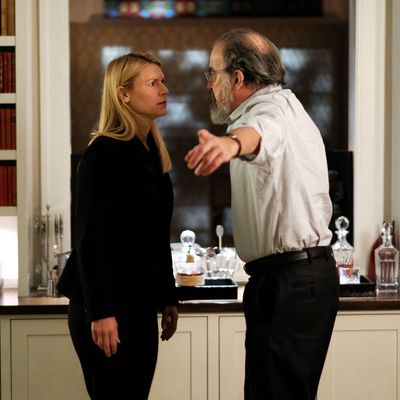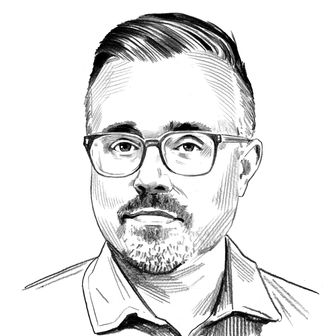
Adapted from an Israeli series called Prisoners of War, Showtime’s Homeland premiered just over a decade after 9/11, an event that lingered in the background of the show throughout its run. In the ten years since that terrorist attack, violence in the Greater Middle East had become something all Americans were more keenly aware of, and Osama bin Laden was killed five short months before Homeland premiered. Leading up to and even shortly after that event, with a few exceptions, portrayals of the ripple effect of 9/11 or the wars in Afghanistan and Iraq were largely patriotic and heroic — the defining show about terrorism in the that first decade was 24, a program that typically saw things in black and white regarding good guys and bad guys, and how much the former could torture the latter to save the world.
But Homeland was a sign that entertainment could start analyzing foreign conflicts and the U.S. role in them in a new way. It had an unstable heroine, haunted by her belief that she could have stopped 9/11, and a male protagonist who was a hero/spy, a prisoner of war coming home not as an American patriot but an enemy in plain sight. For eight seasons, Homeland presented a complex vision of world conflict, one that recognized the cyclical nature of violence in the Greater Middle East as well as the U.S. policy that often influenced and even encouraged it. The show was willing to point a finger at internal enemies as often as it did foreign ones. (Major spoilers for the entire run of the series follow.)
However, the throughline for the entire series wasn’t consistent commentary on foreign policy, but rather a running reminder of the importance of trust and human relationships within systems that often feel inhuman. Carrie Mathison (Claire Danes) may have had people around her that she counted on, including fan-favorite Peter Quinn (Rupert Friend) and the always-reliable Max Piotrowski (Maury Sterling), but the relationship that defined Homeland was the one between Carrie and Saul Berenson (Mandy Patinkin), who went from Middle East Division Chief to Acting Director of the CIA to a National Security Advisor who almost brokered peace with the Taliban, but was always Carrie’s greatest ally. It’s too simplistic to say that Saul mentored Carrie, because she often pushed him in ways that he otherwise wouldn’t have considered. The word that more accurately summarizes their relationship is balance — the kind that’s needed to accomplish great things as a partnership. Carrie and Saul saved the world multiple times over the run of Homeland, often because her fearlessness balanced his pragmatism. He reined her in at times, but just as often gave her the encouragement to do whatever was needed to save the day.
It’s telling that the series ends with this partnership still in place, even if Carrie and Saul may never see each other again in person. Carrie is embedded with Yevgeny (Costa Ronin) in Russia, sending information to Saul in the same manner as his best asset did for decades. While it nearly took Carrie murdering Saul to get to this point, she is ultimately doing what he tells her to do at the end of their very first meeting in the series pilot, when she says she doesn’t know how to prove that an American P.O.W. is not what he seems to be: “Find a way.”
While Patinkin was always a Homeland scene-stealer, it’s telling that he didn’t earn one of his four Emmy nominations for the show in that first year, even as it went on to win Outstanding Drama Series, Lead Actor, and Lead Actress at the 2012 Emmys. (Patinkin has never won for Homeland, which is a shame.) The first season was largely about Nicholas Brody (Damian Lewis) and the romantic spy game he played with Carrie. Saul was more in the background, often as the voice of reason, used to balance out Carrie’s flights of fancy, especially the ones caused by her mental illness.
As Homeland drifted away from Brody — the writers really didn’t know what to do with him after season one, finally killing him off in season three — the dynamic between Saul and Carrie became more and more essential to the show. People like Quinn and Dar Adal (F. Murray Abraham) may have stolen scenes and entire even chunks of seasons, but Saul was always a reliable presence who, as the person who recruited and trained Carrie, was the only one who could always bring her back from the edge, or push her to it, in the name of world safety.
The dynamic between Saul and Carrie really came into focus after season two, which ended with the 12/12 bombing that made Brody a fugitive. With Brody on the run at the start of season three, Saul was installed as the acting director of the CIA. Even in that new “company man” role, though, Saul developed into more of an action hero as the writers phased out his marriage, which had served its dramatic purpose, and even sent him into danger to find Brody. That Carrie and Saul are often working to solve the same problem from different angles started to become the real fabric of the show, and it stayed that way throughout the rest of Homeland’s run. Saul was typically working the back channels in offices while Carrie was doing the hard work on the ground, but the writers smartly allowed those roles to occasionally shift, such as when Carrie became an advisor to a president, and the number of times Saul went behind enemy lines.
For the final season of Homeland, rather than succumbing to the temptation to “go big,” the writers returned to unexpected territory. They brought the action back to the Middle East, and rather than giving into stunt casting major names (no offense meant to the great Hugh Dancy), they brought back characters and subplots from the fourth season while reviving to a key dynamic from the first. In other words, they focused on what works about the show, allowing the final season to pivot on Carrie’s motives, which Saul had never really questioned before — they’ve disagreed on issues, but never each other’s loyalty. Until this season.
The final season finds Saul beginning to wonder if the people around him who are saying that Carrie could have been turned by the Russians between seasons seven and eight might be right. This is an interesting mirror of season one — just as Brody was a prisoner behind enemy lines, so was Carrie with the Russians. But while everyone around her wants to shut Carrie down, Saul’s trust in her is what ultimately ends up saving the world again. Imagine if she was still in a German hospital when President Warner’s helicopter went down. Even as Yevgeny is at least somewhat successfully turning Carrie into a Russian asset, it’s her connection to Saul Berenson that keeps her alive and hunting down the recorder that eventually stops what would become a nuclear conflict in the Middle East.
“The only real hope Saul feels for this planet is Carrie Mathison,” said Mandy Patinkin in an interview before season seven, speaking to the element that the writers smartly chose to ground the final year. When Carrie shows Yevgeny the recording that Saul made in the event of his death, he says, “Who we trust in this life is all that matters.” Saul Berenson trusted Carrie Mathison as the world around them became significantly more dangerous and harder to trust in the 2010s. The combined realities of Homeland and U.S. history tell the story of a decade of turmoil, from elements that directly reflected the real world, like the ascendance of internet manipulation, to ones that were more dramatic, like the in-series accidental death of a U.S. President. And yet Homeland didn’t end its final episode with a bomb or an assassination. It ended with what has always been the beating heart of the series: two people who still trust each other enough to have hope left for this planet.


